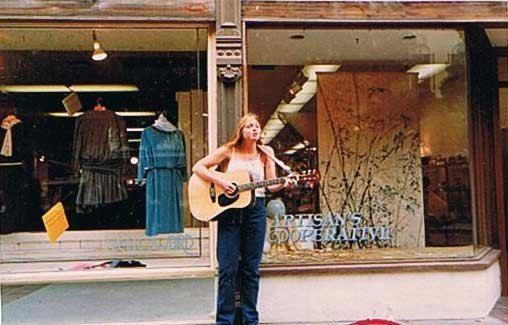
Author, Kirsten Anderberg, busking in Santa Cruz, CA 1983 (Photo: Gerd Kettel)
By Kirsten Anderberg (http://www.kirstenanderberg.com)
Written January 4, 2014
From afar, it may seem like proficiency at an art form (music, magic, etc.) is the most important component to a successful street performing act, but it is not. Honestly, having a professional-quality act is a small part of busking (aka street performing). I've always felt that it is better to be a great performer and a mediocre musician than a great musician and a mediocre performer when it comes to busking. But it goes much deeper than that. As a busker, you have to learn how to play mind games, even on yourself, to survive. How do you interpret a day when you performed beautifully yet only made 6 pennies all day? Do you suck? Do they suck? Was it the weather or time of month or some crazy astrological alignment? Learning to pay your dues without beating yourself up or giving up is perhaps the most important skill a busker can possess. You have to have a bit of a fighter spirit in you to take to the streets with your art. And a fighter spirit is at times necessary to endure many tides of hostile police, rude shop owners, highly competitive buskers and even your own self-doubt.
It can be daunting to stand alone on a street corner and just strap on a guitar and start singing, loudly, as if to be noticed. (It is even weirder if you do not understand how to interact with your audience.) So you sing, and smile and sometimes they stay for a song or two then move on. Sometimes you get a big crowd that stays for the whole set. Sometimes you have banter that amuses your audience between songs, sometimes you get the audience to interact with you, making the show funnier for them and you. But some days, you stand alone, and not only do people not smile and not stop, but they sneer at you and shop owners yell at you to move on 5 minutes into your set. Some days, it would be cold and gray, maybe a Tuesday in February, and I would sing my heart out for hours and just barely make the $1.25 bus fare I needed to get home. All buskers must do a mental dance to get through those low-no tip days and the days where being on the street makes you vulnerable to the hostilities and moods of the street, up close and in your face.
My long-time busker friend Thaddeus Spae told me a story about one of his first times busking with his partner Sandahbeth Spae. He said they were playing with their guitar case open when this man who appeared to be very drunk stood in front of them, looking glazed. Then they began to see a stream of liquid running down his leg, into the street and straight towards their guitar case! If that is not an initiation to the type of endurance required to be a successful busker, I don't know what is. I, personally, have had all sorts of bizarre interactions with people after 30 years of busking. I've had chicken bones thrown in my guitar case (not exactly sure what that says but it can't be complementary!) I've had people prop up fliers they are handing out, advertisements, into my open guitar case as if I am a free billboard service. I've had people plop down young children, toddlers, in front of me on the street while I was busking, leaving me to babysit their kids as they left and shopped while I was, ironically, paying a babysitter to watch my toddler so I could be out busking! One of my favorite "tips" ever was from 3 teenaged girls on the Santa Cruz Mall. They put a handwritten note in my case that said "Shut Up! You have the most obnoxious, horrible voice ever!" I don't know why, but I treasure that note! It seems hilarious to me that they took the time to write it down and give it to me. I remember them looking really disgusted when they put it in my case too. Even funnier! I have had hecklers and pro-life groups surrounding me with gory picket signs protesting my political content/words, I've had shop owners put out speakers in front of their doors to drown me out and force me to leave. I have been given peace disturbance tickets from police at the behest of shop owners and I have been represented in courts by the ACLU for my free speech rights which were being stolen by shop owners. I have performed with busker legends, making incredibly good music on the streets of Portland, OR, only to be drowned out by thunderous applause for a dog that catches 3 frisbees in his mouth. In New Orleans, older male street performers would try to elbow me out of my place waiting for spots to play in Jackson Square, acting like I was some little young white girl who could not stand her own. I would have to go ballistic on them sometimes to get them to get it that I was not going to be fucking around with shit like that. Going back to the street, to try again, after bad days, sometimes several bad days in a row, is part of the strength a busker must muster up inside themselves.
Mike Berger (aka "Magic Mike") coined a term which is quite poignant: "Busker Dread." "Busker Dread" is when you do not want to go out and busk, but you have to, for survival/economic reasons. One great pressure cooker time for buskers and one that often is associated with "busker dread," is when street festivals are in town, thus buskers need to go out and hustle those opportunities while there, even if not in the mood. But "busker dread" can rear its ugly head when you are just trying to drag your ass down to the Pike Place Market in Seattle against your own will, due to the gnawing realities of things like rent and utility bills. Perhaps only those who do it as their sole means of income are forced to learn endurance, or how to overcome "busker dread." I feel like there were as many days when I did not want to go out and busk, when it was my only job and I felt forced to go out, against my will, with a hearty dose of "busker dread" for breakfast, as I had of days when I joyously went out to busk. Maybe even more "busker dread" days, honestly. It starts to get to be like any job you dread, with authority figures you clash with and certain customers you like or dread, etc. You even develop a "co-worker" relationship with other buskers, but the "busker dread" usually only affects career buskers in my experience, as non-career buskers have the option of just not busking when they do not want to. Any professional performer has to learn "the show must go on," but the streets can be much more hostile than a theater packed with paying patrons and a stage. An audience paying before the show also allows the performers to be paid for smiling when wanting to die, unlike many days out busking, for free, while feeling like that!
I understand "busker dread" intimately, yet I still kept busking for more than 30 years. Why? Recently I interviewed women buskers about their busking experiences. Women who busked full time in the 1980's, then had families and did it less as they aged, all seemed to say it was a skill set they still value having and think that they may someday revive the act again in their retirement/later years, after the kids are all grown. I am 52 years old now, and my son is nearly 30 years old and I, too, look at it with an on again/off again romance and realism: remembering the good and the bad of busking. For me, busking is not just a way to make money. It is a way to communicate with other people and communities, it is a way to communicate political ideas in the grand tradition of agit-prop (agitational propaganda) in the public square, it is a means of patrolling/enforcing/supporting free speech rights, it is a way to speak to others in poverty and single motherhood, it is a way to meet and perform with other performers…It is a way to share hope, so part of how I endured the bad of busking was through the balance of good. I've seen the most heartwarming things ever, through the eyes of a busker at street level.
Enduring the hardships busking challenges one with can actually be good for soul growth. The "mind fuck" you need to overcome as a busker is the fiction that tips reflect the quality of an act. As busker the Great Reverend Chumleigh says, Charlton Heston could be down at the Market reciting Shakespeare and people would not tip him one cent, but if he'd dive into a little pool of water off a ladder, endangering himself, they'd give him, oh, 75 cents. It is very easy to get wrapped up in the mythology that a lot of money in tips means you have a great act or talent. And conversely, you need to know that not getting a lot of tips doesn't mean your act sucks. If you do well, making lots of tips, then stop making a lot, for the same act even, it can give you self-doubt. But honestly, each audience is different, full of people having moods and life experiences.
Some say tips drop off at the end of the month and pick up around the first, due to paycheck cycles. I have noticed that people tend to tip less in extreme weather: when it is uncomfortably hot or uncomfortably cold. Some buskers make more money on weekends though I seem to be paid by locals as much, if not more, than tourists so for me, weekdays were often less crowded and easier to get a place to busk, so I preferred busking on weekdays to the intense weekend push. Certainly, performing on streets in the dead of winter, especially after the December holidays have passed, can be brutal. People spent money on the holidays and are less apt to tip in January and February. A busker needs to squirrel away tips from richer tip months to survive these slower times on the streets.
But here is the greatest "mind fuck" of the whole milieu - there is no discernible tipping pattern. I have known hundreds of buskers, from all over the world, for over 3 decades and every busker I have asked: "Have you ever been able to figure out a pattern as to why people tip sometimes and not others?" And every single one has answered "no." And then we lament, together, at not being able to crack that code. Buskers are smart, observant people. They know how to get people to stop, listen and tip. They are a clever sort, with astute entertainment skills, who practice with audiences daily. If anyone would know the tipping patterns, it would be buskers themselves. But honestly, people are as unpredictable as the weather. I don't think there is a cut and dried formula regarding busking and tipping. But I do know that it is futile to base the worth of your act on tips alone, as that will not serve you well.
I had to find internal support, for myself, as a busker. I have used several strategies in the past. I've gone out with emotional armor, telling myself I would perform to the highest level I could, regardless of tips, and as long as my show was professional-level, I could live with myself knowing that I had done the best I could. I would also emotionally prepare myself by thinking in the event that I received no tips, I could look at it as a rehearsal. I also would tell myself that just because I received no tips this time, someone may not have money today, but next time will tip me based on high quality they saw today combined with later performances (or they would reward a pattern of quality over time). I'd tell myself I could get gigs later from people seeing me performing today. I would tell myself I could inspire other girls and women to busk just by my mere presence. I often times used slow tip days to focus on making contact with street folks and sharing a little free inspirational music with them. Sometimes I busked simply to have contact with other humans, whether it was other buskers, street folks or audiences. Sometimes I was so depressed at home alone, busking was a therapy to keep me from giving up on life in general. I reminded myself that I received non-monetary tips as well, from busking, such as high-quality alternative health care, free food at restaurants and farmers' stalls, free handmade wooden toys for my son, etc. I also acknowledged that busking made me part of communities, which made me privy to community resources as well.
I guess what I am saying is making tips or money is not enough motivation to overcome the busker bumps in the road. You need to have a higher calling, almost, to be a busker. My busker friend Christine Gunn recently commented that all buskers seem to be cut from the same cloth, and in some ways, that does seem true. They are predominantly leftist in their politics, antiauthoritarian, and tend to have a "go get 'em" attitude. Buskers don't wait for permission or paid gigs. They just burst forward with performance for free on streets. I adore that spirit. Another busker, P.K.Dwyer, wrote a lyric I will paraphrase here: "I wanted it more than I was afraid." I think devoted buskers just want it more than they are afraid - because we are afraid, as any fool would be - but our desires to busk successfully outweigh the fear that would inhibit one and cause inaction.
My busker friend Thaddeus Spae wrote a song about a legendary busker character in Venice, CA named Harry Perry. Harry wore a white turban and white Sikh clothing, with roller skates/blades. He had an amp strapped on his back and an electric guitar on his front. He'd roll up alongside tourists on the Venice Beach Boardwalk, keeping pace with their step on his skates while playing music, until they would tip him and he would roll away. (He also played in stationary spots at times too, but he was mostly on the move.) Thaddeus wrote a song called "Harry on the Beach." The chorus says, "You can get what you want to get, but you have to ask for it." In many ways, that is the essence of busking. You have to learn how to ask for things more valuable than money - that may be the key that opens the door that keeps you coming back for more.
For more articles written by Kirsten Anderberg, visit http://www.kirstenanderberg.com. To see a selection of books written by K. Anderberg, visit http://www.amazon.com/Kirsten-Anderberg/e/B004M3MZM2
Thank you to Resist.ca for hosting this website!




